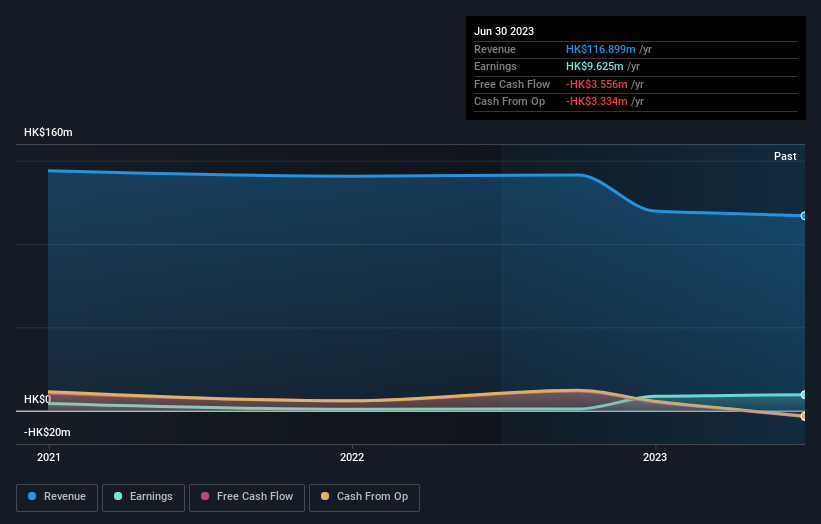Fenbo Holdings Limited's (NASDAQ:FEBO) Senior Key Executive Kin Shing Li is the most upbeat insider, and their holdings increased by 13% last week
Key Insights
Insiders appear to have a vested interest in Fenbo Holdings' growth, as seen by their sizeable ownership
Kin Shing Li owns 72% of the company
Ownership research, combined with past performance data can help provide a good understanding of opportunities in a stock
A look at the shareholders of Fenbo Holdings Limited (NASDAQ:FEBO) can tell us which group is most powerful. We can see that individual insiders own the lion's share in the company with 81% ownership. Put another way, the group faces the maximum upside potential (or downside risk).
As a result, insiders were the biggest beneficiaries of last week’s 13% gain.
Let's delve deeper into each type of owner of Fenbo Holdings, beginning with the chart below.
View our latest analysis for Fenbo Holdings
What Does The Lack Of Institutional Ownership Tell Us About Fenbo Holdings?
We don't tend to see institutional investors holding stock of companies that are very risky, thinly traded, or very small. Though we do sometimes see large companies without institutions on the register, it's not particularly common.
There are multiple explanations for why institutions don't own a stock. The most common is that the company is too small relative to funds under management, so the institution does not bother to look closely at the company. Alternatively, there might be something about the company that has kept institutional investors away. Fenbo Holdings' earnings and revenue track record (below) may not be compelling to institutional investors -- or they simply might not have looked at the business closely.
Hedge funds don't have many shares in Fenbo Holdings. Because actions speak louder than words, we consider it a good sign when insiders own a significant stake in a company. In Fenbo Holdings' case, its Senior Key Executive, Kin Shing Li, is the largest shareholder, holding 72% of shares outstanding. The second and third largest shareholders are Ming Pang Fung and Tong Lam Yuk, with an equal amount of shares to their name at 4.5%.
Researching institutional ownership is a good way to gauge and filter a stock's expected performance. The same can be achieved by studying analyst sentiments. As far as we can tell there isn't analyst coverage of the company, so it is probably flying under the radar.
Insider Ownership Of Fenbo Holdings
While the precise definition of an insider can be subjective, almost everyone considers board members to be insiders. Management ultimately answers to the board. However, it is not uncommon for managers to be executive board members, especially if they are a founder or the CEO.
Most consider insider ownership a positive because it can indicate the board is well aligned with other shareholders. However, on some occasions too much power is concentrated within this group.
Our most recent data indicates that insiders own the majority of Fenbo Holdings Limited. This means they can collectively make decisions for the company. That means they own US$83m worth of shares in the US$102m company. That's quite meaningful. Most would argue this is a positive, showing strong alignment with shareholders. You can click here to see if those insiders have been buying or selling.
General Public Ownership
The general public-- including retail investors -- own 19% stake in the company, and hence can't easily be ignored. While this group can't necessarily call the shots, it can certainly have a real influence on how the company is run.
Next Steps:
It's always worth thinking about the different groups who own shares in a company. But to understand Fenbo Holdings better, we need to consider many other factors. Case in point: We've spotted 3 warning signs for Fenbo Holdings you should be aware of, and 2 of them are significant.
Of course this may not be the best stock to buy. Therefore, you may wish to see our free collection of interesting prospects boasting favorable financials.
NB: Figures in this article are calculated using data from the last twelve months, which refer to the 12-month period ending on the last date of the month the financial statement is dated. This may not be consistent with full year annual report figures.
Have feedback on this article? Concerned about the content? Get in touch with us directly. Alternatively, email editorial-team (at) simplywallst.com.
This article by Simply Wall St is general in nature. We provide commentary based on historical data and analyst forecasts only using an unbiased methodology and our articles are not intended to be financial advice. It does not constitute a recommendation to buy or sell any stock, and does not take account of your objectives, or your financial situation. We aim to bring you long-term focused analysis driven by fundamental data. Note that our analysis may not factor in the latest price-sensitive company announcements or qualitative material. Simply Wall St has no position in any stocks mentioned.

 Yahoo Finance
Yahoo Finance 

